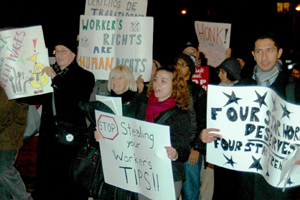Nationwide Actions Shame Wage-Stealing Bosses

Thirty-five cities saw protests against wage theft on Thursday as part of the Interfaith Worker Justice National Day of Action against Wage Theft.
Organizers of the rallies say wage theft is an epidemic, with billions legally earned by workers but stolen by their employers. For most victims of this crime, the theft is on top of already inadequate wages.
“This Thanksgiving, as a nation we are struggling with how to boost the economy,” said Kim Bobo, executive director of Interfaith Worker Justice. “What better way to stimulate the economy, put more money back into neighborhood businesses, than to assure that workers are paid all their wages?”
Wage theft takes the form of work done off the clock, stolen tips, pay below minimum wage, no time and a half for overtime, and other employer tricks, such as not being allowed your break or your lunch. In addition, around 3 million workers—from construction workers to janitors—are misclassified as independent contractors, allowing their employers to deny overtime pay premiums and to escape paying in to Social Security.
The Economic Policy Foundation, a business-funded group, estimates that workers miss out on $19 billion a year in unpaid overtime alone.
It’s not just small businesses. This month worker advocates in Minneapolis protested wage violations by cleaning companies working for Target and other big-box retailers. A federal Department of Labor investigation in 2007 revealed that contract cleaners failed to pay proper overtime, resulting in 106 violations totaling more than $25,000 in unpaid wages. In the last decade, corporate retail stores across the country have centralized control over store cleaning contracts, dropping wages for cleaners in Minneapolis chain stores from around $11 an hour to $7 and doubling workloads.
In Madison, Wisconsin, the rally announced a commitment from the district attorney to pursue prosecution of wage theft cases. In Houston, a “Justice Bus” visited local businesses accused of wage theft.
In Chicago, a delegation of 40 people from community, faith, and labor backgrounds marched to Superior Hand Car Wash to deliver a giant sponge for the boss and tell him to stop sponging off the workers. The action was led by the Arise Chicago interfaith workers’ rights organization.
Luis Perez, who works at the car wash, had records showing that not only was he being paid an average of $4 an hour, but he had been working 60-80 hours a week. The delegation members held their ground in the waiting room of the car wash, and after a long negotiation, the boss agreed to pay $1,000 toward his debt to Perez—who is owed more than $5,000 by Arise’s reckoning.
BATALI BATTALION

SUPPORT LABOR NOTES
BECOME A MONTHLY DONOR
Give $10 a month or more and get our "Fight the Boss, Build the Union" T-shirt.
In New York City, a spirited crowd of 50 marched around the West Village, visiting restaurants associated with celebrity chef Mario Batali.
Workers charge that their tips were stolen for banquet work done at Batali’s upscale restaurant Del Posto. The crowd made noisy stops at Batali restaurants Babbo, Luba, and Otto, leafleting customers and staff. One sign read: “If I steal, I go to jail; if Batali steals, he gets rich.” The crowd was blocked from Del Posto by security surrounding a nearby Michelle Obama visit.
At a rally after the march, Maria Corona recounted her experience working 60- to 80-hour weeks with no overtime pay at Flaum Appetizing, a Brooklyn kosher food producer.
She was fired when she became a vocal supporter of organizing efforts at Flaum. Sixteen co-workers walked out in protest—all were fired.
The workers calculate that their employer owes them $230,000 in back pay. They are currently arguing their case before the NLRB, according to Marty Kirchner of the New York City Brandworkers International, a group organizing support for the workers.
HOW WIDESPREAD?
The extent of wage theft is hard to measure. The Chinese Progressive Association in San Francisco attempted to recently, conducting a study which found that that half of Chinatown restaurant workers are working for less than minimum wage. A study they released in September, “Check Please!”, found that 20 percent work more than 60 hours a week.
With stolen wages so widespread, advocates are looking to strengthen the tools they use against employers. Ten states have passed laws that strengthen protections against wage theft and misclassification.
But federal wage and hour laws have a restrictive statute of limitations. Prosecutors are forced to resolve wage-theft cases within two years, so advocates are pushing federal legislation that would permit prosecutors to pursue a case for as long as it takes, as long as it’s filed within two years of the crime.




